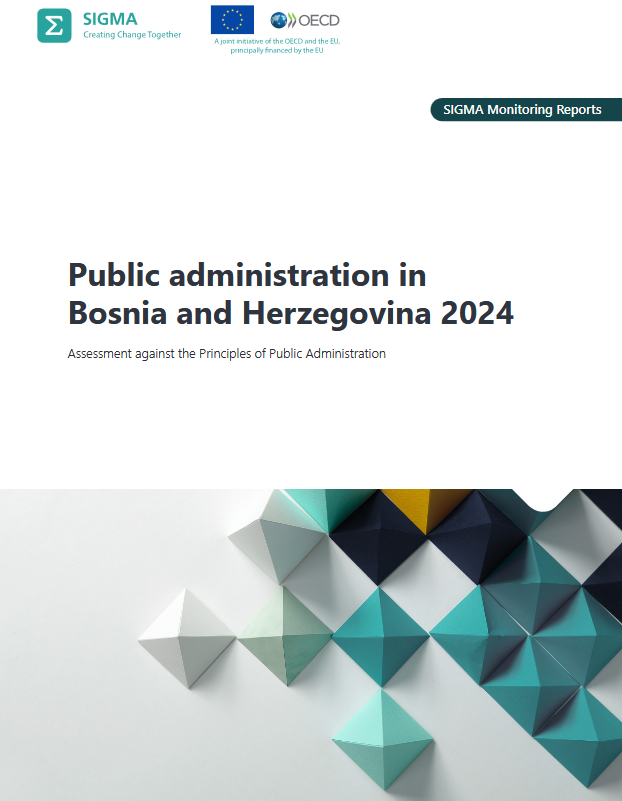The progress that the Agency for Identification Documents, Registers, and Data Exchange (IDDEEA) made has been particularly highlighted in the latest SIGMA Monitoring Reports 2024, which assess the state of public administration in Bosnia and Herzegovina according to OECD and European Union standards. This report is a key indicator of the progress of Bosnia and Herzegovina in public administration reform and its alignment with European standards. SIGMA, as a joint programme of the OECD and the European Commission, provides expert analysis and recommendations for improving administrative capacities and the efficiency of institutions, which is essential for the process of European integration and improving service quality for citizens.
Among the many areas analysed, IDDEEA stands out as an institution leading the digitalisation and modernisation of public administration. Its initiatives have not only enhanced the efficiency of state services but have also significantly contributed to improving the user experience for both citizens and the business community.
Digitalization of key registers – The foundation of modern identity
One of the most significant achievements of IDDEEA is the complete digitalisation of key registers, including the registers of births, residences, and citizenship. Thanks to these reforms, all state institutions now have quick and secure access to this data in compliance with legal authorisations. This change has enabled more efficient administration, eliminated unnecessary paperwork, and significantly reduced the time of processing of the citizens’ requests. Register digitisation lays the groundwork for e-government development and enables citizens to access safer, faster, and more advanced public services.
Qualified electronic signature – a key step towards full digital identification
A crucial first step towards complete digital identification is obtaining a qualified electronic signature.
An important step forward for Bosnia and Herzegovina in the realm of digital authentication was taken in February 2024 when IDDEEA launched the advanced service of the qualified electronic signature. This innovation enables citizens to sign electronic documents quickly and securely with no need for additional equipment, such as card readers. The free electronic signature represents a revolutionary step in digital transformation, as it enables citizens to interact more quickly and securely with institutions and the private sector, including banks, telecommunications companies, and other service providers.
International compliance and European standards
Another important achievement of IDDEEA is its international certification and full compliance with the EU eIDAS regulation. This confirms that the digital services of the Agency are at the highest level of security and interoperability, enabling the citizens of Bosnia and Herzegovina to use digital identities in accordance with EU standards. This is crucial not only for easier interaction with domestic institutions but also for future connections with the European digital market.
Integration of electronic signatures into everyday services
IDDEEA actively works with top banks and telecom providers in Bosnia and Herzegovina to guarantee the electronic signature’s broad adoption and incorporation into routine transactions. The implementation of electronic signatures in banking and telecommunications services will enable citizens to swiftly and safely complete transactions and contracts online, eliminating the need to visit physical offices. This measure also helps to modernise the economy and makes it easier to conduct business in a digital setting.
Challenges and future steps
Although significant progress has been made, the digital transformation of public administration in Bosnia and Herzegovina still faces some challenges. One of the key issues is the lack of clear rules that oblige institutions to share data with each other. Although the registers are digitalised, without defined legal frameworks regulating mandatory data exchange between institutions, citizens still often have to physically deliver documents from one institution to another.
Additionally, the technical infrastructure for data exchange via the Government Service Bus (GSB) platform is still not fully operational. This platform, which should enable the smooth flow of information between different levels of government and state institutions, is currently not using its full capacity, which slows down the further digitalisation of administrative processes.
To fully recognise digital identities internationally, Bosnia and Herzegovina must further align its laws with the eIDAS 2.0 rule, in addition to overcoming technical obstacles.
Conclusion
By enhancing the security, effectiveness, and accessibility of administrative services, IDDEEA is still at the forefront of Bosnia and Herzegovina’s public administration digitisation. By introducing the free electronic signature, digitising important registries, and conforming to European standards, the Agency demonstrates its significant contribution to the modernisation of public administration and the enhancement of services for both citizens and enterprises.
According to research, services provided by IDDEEA have the highest satisfaction rate among citizens of Bosnia and Herzegovina, with over 70% positive ratings, confirming that the Agency is a leader in providing modern, efficient, and secure administrative services.
The achieved progress lays a strong foundation for further development of e-Government in Bosnia and Herzegovina. Therefore, we call on all relevant institutions to strengthen mutual cooperation and align the legislative and technical frameworks to enable even faster and more efficient delivery of digital services.
For more information, visit www.iddeea.gov.ba or contact our PR team via email at iddeea@iddeea.gov.ba.
